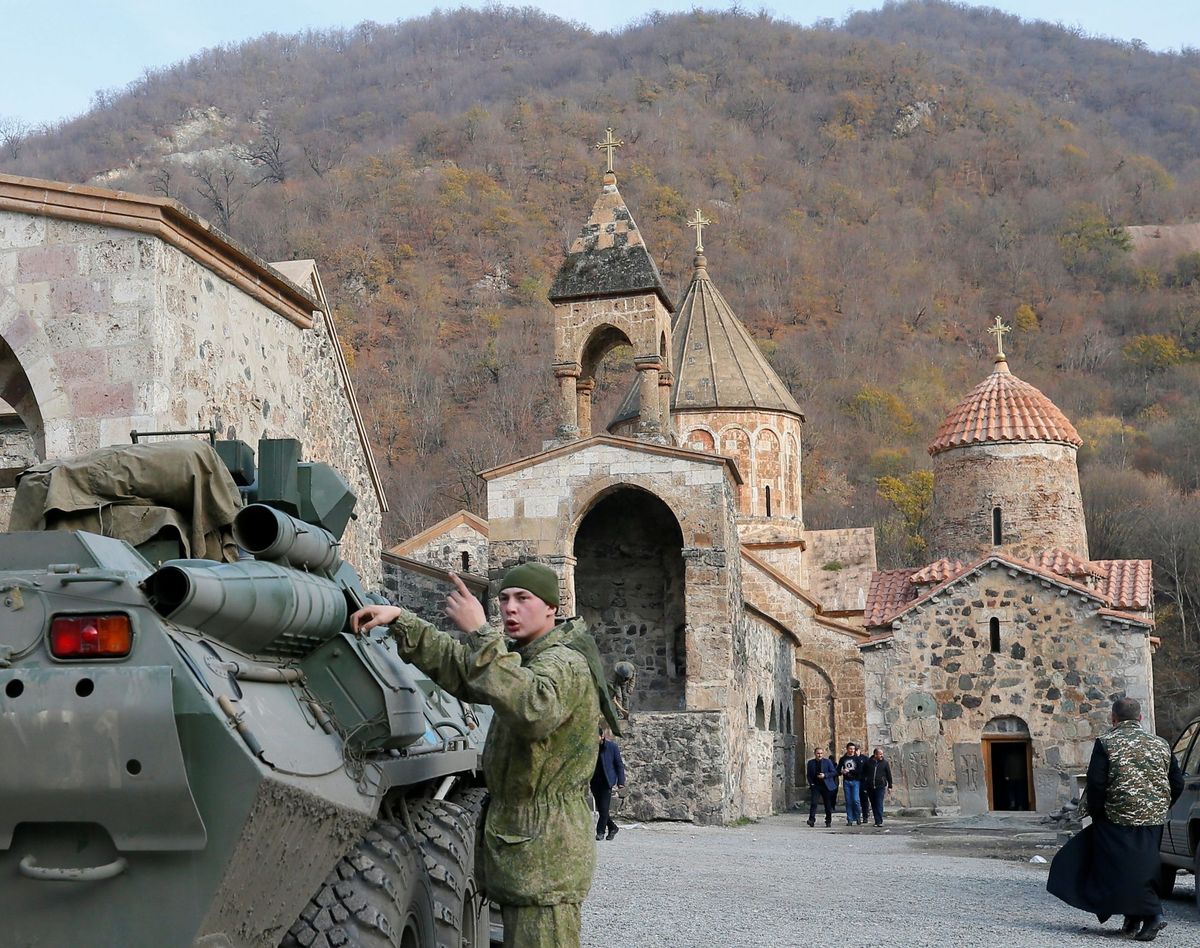The Armenia-Azerbaijan peace treaty is only considered a victory in Azerbaijan

A few minutes every morning is all you need.
Stay up to date on the world's Headlines and Human Stories. It's fun, it's factual, it's fluff-free.
As the new treaty is viewed as a surrender by many in Armenia, this ceasefire may not last either.
After six weeks of military conflict resulting in thousands of deaths and displaced residents, Armenia and Azerbaijan signed a peace treaty on November 9. The peace deal, which officially took effect at midnight on Tuesday, November 10, local time, was celebrated in Azerbaijan. In Armenia, however, the uneasy truce has been met by protests, anger and fear of what comes next.
The fighting involved a region known as Nagorno-Karabakh in Azerbaijan, or Artsakh in Armenia. The region has been a source of conflict between the two nations for decades, but up until this year, there had been an on-and-off ceasefire between the countries. As the new treaty is viewed as a surrender by many in Armenia, this ceasefire may not last either.
The end of hostilities in Nagorno-Karabakh
The conflict between Armenian and Azerbaijan officially began on September 27 when Azerbaijan’s military forces moved into Nagorno-Karabakh. Though that region has been internationally recognized as being part of Azerbaijan, it has, until this peace treaty, been overwhelmingly filled with Armenian citizens.
Russia helped broker the peace deal between the two countries that was signed on November 9. It was originally announced by Armenian Prime Minister Nikol Pashinyan in a Facebook post and was later confirmed by Azerbaijani President Ilham Aliyev and Russian President Vladimir Putin. Prior to the peace deal, Russia had deployed nearly 2,000 peacekeeping troops to the region.
The terms of the peace deal permit Azerbaijan to continue to hold onto the areas within Nagorno-Karabakh that its military seized in recent weeks. Areas that will now be under Azerbaijan’s control include the Agdam, Kalbajar and Lachin districts, which, since the 1990s, had been within the Armenian-aligned Republic of Artsakh.
Russia’s peacekeeping forces will remain in the area for five years to help ensure the peaceful relocation of residents. Armenians in the newly Azerbaijani-controlled districts are now expected to leave those areas.
Prior to the signing of the peace accord, Azerbaijani President Aliyev said in a BBC interview that he didn’t think peace was possible so long as Pashinyan remained Armenia’s prime minister. Aliyev said his country would fight to the end unless Armenian agreed to vacate the disputed regions. Ultimately, Azerbaijan’s military strength ensured just that outcome.
The mixed reactions
A New York Times report on the transition exemplified the diametrical reactions: Azerbaijanis were celebrating in the streets, with flags flying in the capital city of Baku. Back in the disputed districts, though, Armenians who were now being forced to leave their homes were burning houses and cutting down trees to ensure valuable resources were not left behind for the incoming inhabitants.
Meanwhile, in the Armenian capital city, Yerevan, citizens have protested en masse, calling for the removal of Prime Minister Pashinyan. Many believe he has betrayed the Armenian people in the region and given up too easily. Pashinyan has attempted to temper the anger within his country, but throngs of protesters continue to call for his ouster.
In fact, in the Facebook post in which he announced the ceasefire, Pashinyan expressed his displeasure with the results. He called the deal “a hard, hard decision for me and everyone” and said it was “unbelievably painful for me and our people.” Nonetheless, he stated, it was the best decision for the moment and now Armenian could start a “rebirth season.”
The sense of loss being felt in Armenia is countered by the Azerbaijani joy at reclaiming land that had once belonged to the country. Citizens of Azerbaijan were forced to leave that very land in the 1990s after the war between the two countries. Russia also helped broker that peace deal, which resulted in Azerbaijanis being banished from their homes.
Meanwhile, Armenians who had fled the region during this recent conflict and are permitted to stay in Nagorno-Karabakh are making their return to their war-torn homes. However, even for those Armenians who are allowed to return, knowing that so many friends and family members brutally lost their lives has left them feeling that they have suffered a great defeat.
Understanding the Armenia-Azerbaijan conflict
While the recent fighting between Armenia and Azerbaijan is directly related to the war in the early 1990s, the conflict goes back even further, to World War I. It began with the Armenian Genocide, when as many as 1.5 million Armenians living in the Ottoman Empire (which includes modern day Turkey, Armenia and Azerbaijan) were killed and many others were forcibly removed from the region.
While the Azerbaijanis have claim to Nagorno-Karabakh, according to international bodies, the region had been occupied by Armenians for centuries prior to the 20th century. Nonetheless, Azerbaijan has insisted that the region rightfully belongs to them. They feel international governments have unduly supported Armenia’s occupation of their territory.
For Armenians in the disputed region, this most recent conflict has been about more than just territory. They fear Azerbaijani retaliation. As Dr. Alfred Mueller, Dean of Arts and Sciences at Neumann University, explained to TMS in October, Armenians in Nagorno-Karabakh fear that Azerbaijanis, who are backed by Turkey, “will engage in a full-scale genocide.”
Since the 1994 ceasefire, both sides have broken the peace. However, Azerbaijan initiated the most recent military conflict. Azerbaijan has also been accused of committing war crimes, which includes video evidence of Azerbaijani troops in October capturing and extralegally executing Armenian soldiers.
Have a tip or story? Get in touch with our reporters at tips@themilsource.com




Comments ()